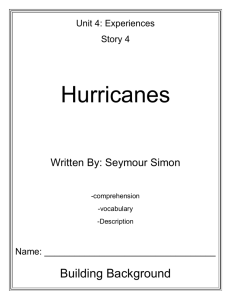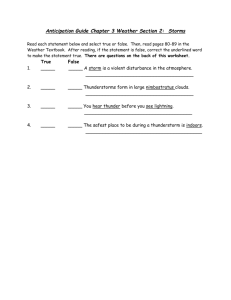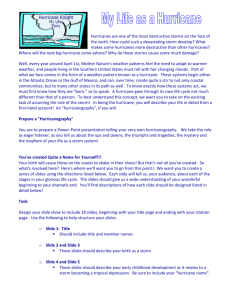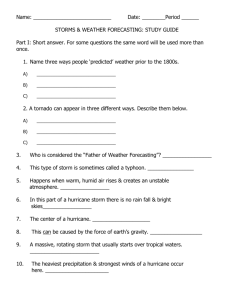Galvez-Lake Volunteer Fire Department Offers Hurricane Safety Tips
advertisement
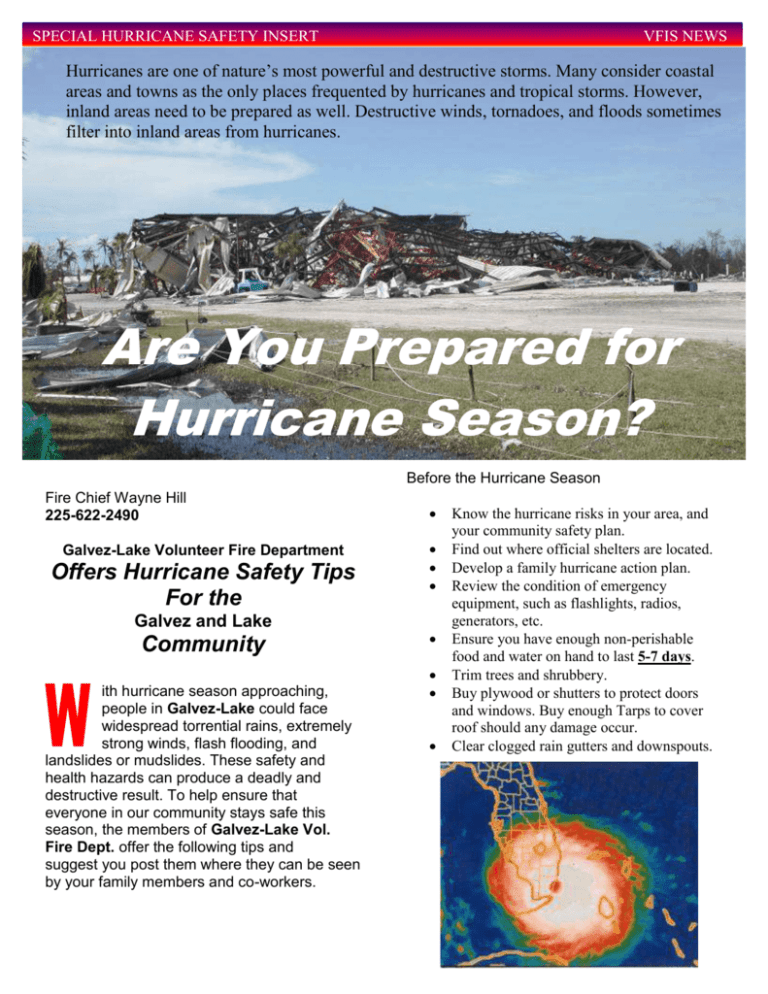
SPECIAL HURRICANE SAFETY INSERT VFIS NEWS Hurricanes are one of nature’s most powerful and destructive storms. Many consider coastal areas and towns as the only places frequented by hurricanes and tropical storms. However, inland areas need to be prepared as well. Destructive winds, tornadoes, and floods sometimes filter into inland areas from hurricanes. Are You Prepared for Hurricane Season? Before the Hurricane Season Fire Chief Wayne Hill 225-622-2490 Galvez-Lake Volunteer Fire Department Offers Hurricane Safety Tips For the Galvez and Lake Community ith hurricane season approaching, people in Galvez-Lake could face widespread torrential rains, extremely strong winds, flash flooding, and landslides or mudslides. These safety and health hazards can produce a deadly and destructive result. To help ensure that everyone in our community stays safe this season, the members of Galvez-Lake Vol. Fire Dept. offer the following tips and suggest you post them where they can be seen by your family members and co-workers. Know the hurricane risks in your area, and your community safety plan. Find out where official shelters are located. Develop a family hurricane action plan. Review the condition of emergency equipment, such as flashlights, radios, generators, etc. Ensure you have enough non-perishable food and water on hand to last 5-7 days. Trim trees and shrubbery. Buy plywood or shutters to protect doors and windows. Buy enough Tarps to cover roof should any damage occur. Clear clogged rain gutters and downspouts. SPECIAL HURRICANE SAFETY INSERT Courtesy of Estero Fire Rescue (FL) Press Release: Hurricane Safety Tips continued National Weather Service Advisories: Know What to Listen For Hurricane/Tropical Storm Watch: Hurricane/tropical storms are possible in the specified area of the Watch, usually within 36 hours. During a Watch, prepare your home and review your evacuation plan in case a Hurricane/Tropical Storm Warning is issued. Hurricane/Tropical Storm Warning: Hurricane/tropical storm conditions are expected in the specified area of the Warning, usually within 24 hours. Complete storm preparations and leave the threatened area if directed by local officials. Short Term Watches and Warnings: These warnings provide detailed information on specific hurricane threats, such as floods and tornadoes. Flood Watch: Informs the public and cooperating agencies of possible flooding. If you are in a Watch area, check flood action plans, keep informed, and be ready to act if a warning is issued or you see flooding. Flood/Flash Flood Warning: A flood/flash flood Warning is issued for specific communities, streams or areas where flooding is imminent or in progress. Persons in the warning area should take precautions IMMEDIATELY! Sources: Hurricane safety information contained herein is excerpted from the USFA/FEMA document Are You Ready? An In-depth Guide to Citizen Preparedness IS-22 (www.fema.gov/areyouready/) and from The U.S. Department of Commerce, National Oceanic and Atmospheric Administration, and National Weather Service publication, Hurricanes…Unleashing Nature’s Fury (www.nws.noaa.gov). Other References: Against the Wind: Protecting Your Home from Hurricane and Wind Damage www.fema.gov/txt/hazards/hurricanes/survivingthestormhurricane.txt VFIS NEWS National Hurricane Center www.nhc.noaa.gov ******Before the Storm****** Check media outlets for official news of the storm’s progress. Fuel and service family vehicles. Have extra cash on hand. Prepare to cover all windows and doors with shutters or other shielding materials. Bring inside lightweight objects such as grills, lawn furniture, and garden tools. During*****In the Storm a Warning Area***** Check media outlets for official news of the storm’s progress. Complete preparation activities such as putting up shutters and storing loose objects. Follow instructions issued by local officials. Leave immediately if told to do so. If evacuating, try to leave during daylight. Leave mobile homes. Notify neighbors and family members of your plan to evacuate. Take pets with you. Note: Shelters may not accept pets. If staying at home… Only stay at home if you have not been ordered to leave. Stay inside a well-constructed building. Turn refrigerator to its coldest setting and keep closed. Turn off utilities if told to do so by authorities. Turn off propane tanks. Unplug small appliances. Fill a bathtub, sink, or large containers with water for sanitary purposes. In case of strong winds… Stay away from windows and doors even if they are covered. Close all interior doors, and brace external doors. Stay in an interior first-floor room, such as a bathroom or closet. Lie on the floor under a table or another sturdy object. **********After the Storm************ Names for 2013 Hurricane Season Check media outlets for official news of the storm’s passing and current road conditions. Wait until an area is declared safe before entering. Do not attempt to drive across flowing water. Stay away from moving water, and do not allow children to play in flooded areas. Call in emergency responders to attempt rescues. Many people have been killed or injured trying to rescue others from flooded areas. Stay away from standing water. It may be electrically charged! Have professionals check gas, water, and electrical lines for damage. Use tap water for drinking and cooking only after local officials declare it is safe to do so. “These are just a few of the safety precautions to consider during hurricane season,” says Fire Chief Wayne Hill at Galvez-Lake Vol. Fire Dept. “It’s also very important to make sure your fire extinguishers are placed in proper locations around your home, and to ensure you have a working flashlights and battery powered radio on hand. By taking the right precautions, you can be prepared for the hurricane season.” Sources: Hurricane safety information contained herein is excerpted from the USFA/FEMA document Are You Ready? An In-depth Guide to Citizen Preparedness IS-22 (www.fema.gov/areyouready/) and from The U.S. Department of Commerce, National Oceanic and Atmospheric Administration, and National Weather Service publication, Hurricanes…Unleashing Nature’s Fury (www.nws.noaa.gov). Other References: Against the Wind: Protecting Your Home from Hurricane and Wind Damage www.fema.gov/txt/hazards/hurricanes/survivingthestormhurricane. txt National Hurricane Center www.nhc.noaa.gov Andrea Barry Chantal Dorian Erin Fernand Gabrielle Humberto Ingrid Jerry Karen Lorenzo Melissa Nestor Olga Pablo Rebekah Sebastien Tanya Van Wendy Please make YOUR FAMILY has enough food, water, medicine, cash, and fuel for generators to last 5-7 DAYS ***Make sure you also have tarps for your home. Supplies are expected to be limited this year and may not be available until days after the storm. Purchase them ahead of time to insure you have your supplies. The day before the storm may be too late.
